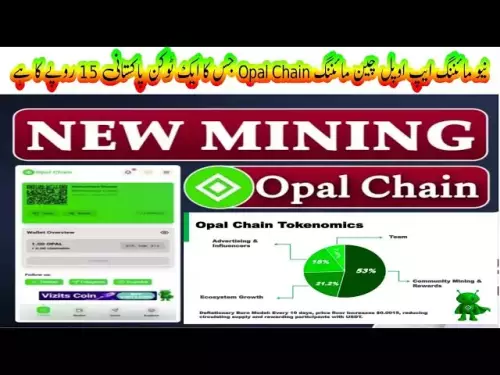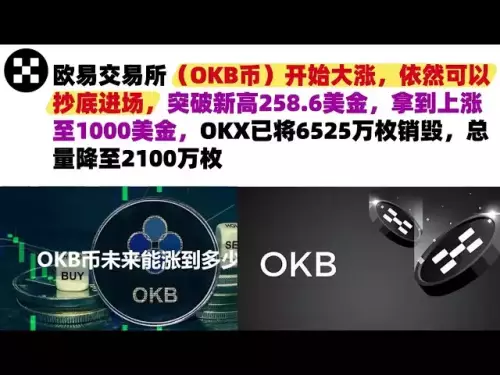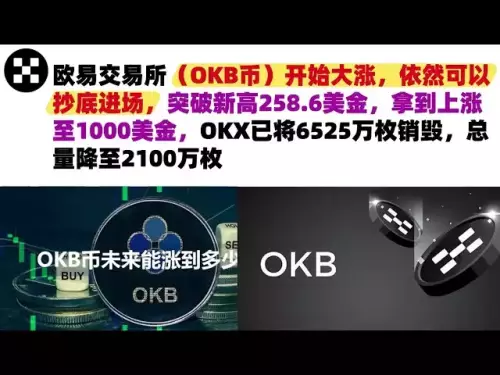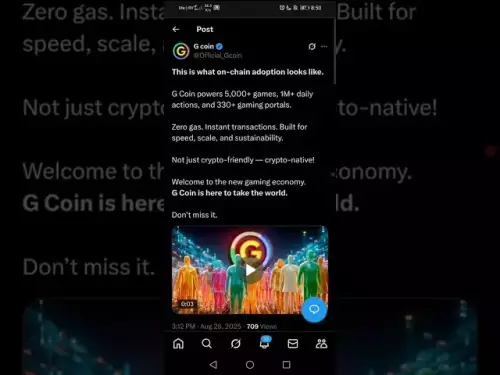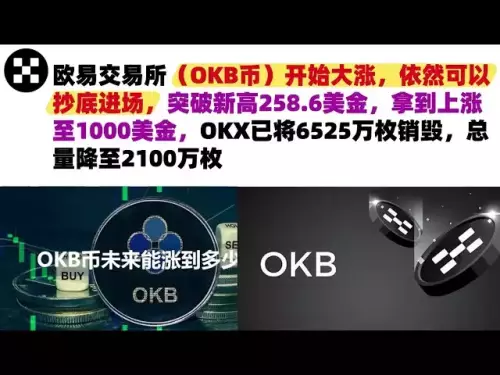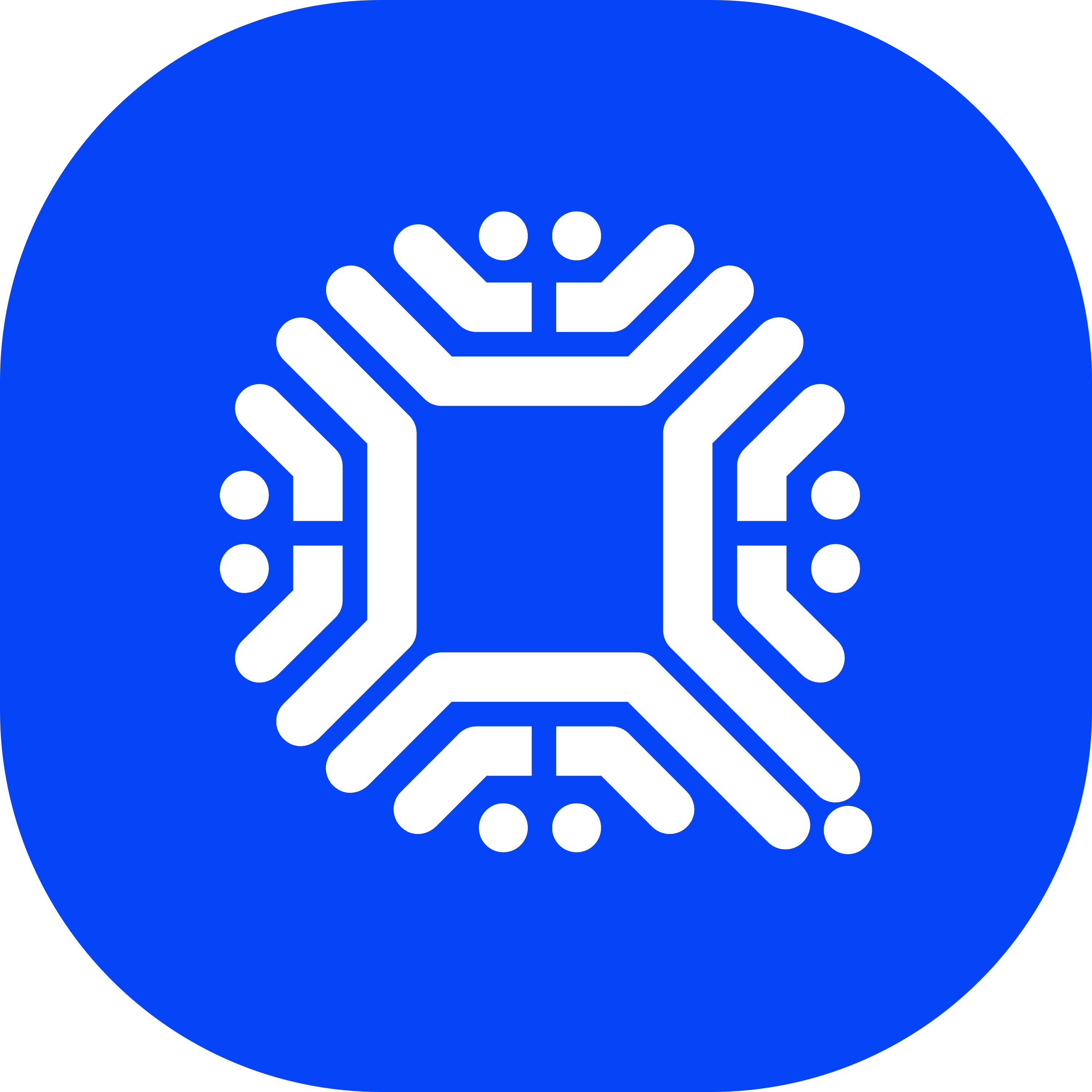-
 Bitcoin
Bitcoin $108900
0.46% -
 Ethereum
Ethereum $4373
0.96% -
 Tether USDt
Tether USDt $1.000
-0.01% -
 XRP
XRP $2.808
-1.19% -
 BNB
BNB $858.6
-0.17% -
 Solana
Solana $201.0
-3.00% -
 USDC
USDC $0.9998
-0.01% -
 Dogecoin
Dogecoin $0.2161
0.88% -
 TRON
TRON $0.3379
0.94% -
 Cardano
Cardano $0.8227
-0.84% -
 Chainlink
Chainlink $23.39
-0.59% -
 Hyperliquid
Hyperliquid $44.08
-1.97% -
 Ethena USDe
Ethena USDe $1.001
0.01% -
 Sui
Sui $3.305
-0.25% -
 Stellar
Stellar $0.3558
-1.34% -
 Bitcoin Cash
Bitcoin Cash $544.8
1.89% -
 Cronos
Cronos $0.3127
13.43% -
 Avalanche
Avalanche $23.88
1.03% -
 Hedera
Hedera $0.2253
-0.58% -
 UNUS SED LEO
UNUS SED LEO $9.500
0.68% -
 Litecoin
Litecoin $110.5
0.03% -
 Toncoin
Toncoin $3.132
1.74% -
 Shiba Inu
Shiba Inu $0.00001242
2.17% -
 Uniswap
Uniswap $9.754
1.80% -
 Polkadot
Polkadot $3.785
-0.02% -
 Dai
Dai $1.000
0.00% -
 Bitget Token
Bitget Token $4.539
0.24% -
 Aave
Aave $314.9
0.87% -
 Monero
Monero $257.9
-1.32% -
 Ethena
Ethena $0.6606
1.38%
How to understand gas limits in MetaMask?
Setting the right gas limit in MetaMask is crucial—too low and your transaction fails, too high and you pay more than necessary; always review the estimate and adjust based on transaction complexity.
Aug 30, 2025 at 06:22 am
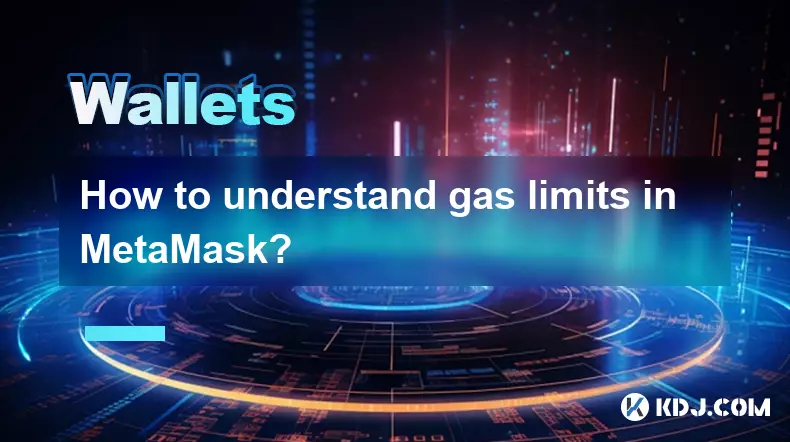
Understanding Gas Limits in MetaMask
1. Gas limits represent the maximum amount of gas a user is willing to spend on a transaction in the Ethereum network. When interacting with decentralized applications or transferring tokens through MetaMask, each operation requires computational power. The gas limit sets a cap on how much gas can be consumed. If the transaction uses less than the specified limit, the unused gas is refunded automatically. However, if the execution exceeds the limit, the transaction fails and the gas is still consumed.
2. Every Ethereum transaction includes a gas limit and a gas price. The product of these two values determines the maximum transaction fee. For example, if the gas limit is set to 21,000 and the gas price is 50 gwei, the maximum fee would be 1.05 million gwei, or 0.00105 ETH. MetaMask usually suggests a default gas limit based on the transaction type, but users can manually adjust it depending on network conditions or contract complexity.
3. Simple transactions like sending ETH typically require a gas limit of 21,000 units. More complex interactions, such as swapping tokens on a decentralized exchange or minting an NFT, involve smart contract execution and therefore demand higher gas limits. Setting a gas limit too low for a complex operation may result in out-of-gas errors, where the transaction reverts and the fee is lost.
4. Users should monitor the Ethereum network congestion when setting gas limits. During peak times, more gas may be required due to increased competition for block space. MetaMask provides real-time gas price suggestions, but experienced users may choose to customize both gas price and limit to balance cost and speed. Overestimating the gas limit is safe, as only the consumed portion is charged.
5. Incorrect gas limit settings are one of the most common causes of failed transactions in MetaMask. New users often reduce the suggested limit to save on fees, not realizing that complex smart contract functions require higher computation. It is crucial to understand the nature of the transaction and refer to dApp documentation or community resources when unsure.
How Gas Limits Affect Transaction Success
1. The Ethereum Virtual Machine (EVM) executes transactions step by step, consuming gas at each stage. If the available gas falls below what is needed to complete an operation, execution halts immediately. Even if 99% of the process is complete, the entire transaction is reverted, and no changes are recorded on the blockchain.
2. A transaction that runs out of gas is considered invalid, but the sender still pays for the computation performed up to that point. This means users lose the gas fee despite the failure. This mechanism prevents malicious actors from overloading the network with infinite loops, as each operation has a finite cost.
3. Some decentralized applications provide recommended gas limits for specific actions. For instance, a yield farming platform might suggest a gas limit of 500,000 for depositing into a liquidity pool. Ignoring these recommendations and using a lower value can lead to repeated failures and unnecessary expenditure.
4. MetaMask attempts to estimate the required gas limit before submission. However, this estimation is not always accurate, especially for transactions involving dynamic logic or multiple contract calls. In such cases, adding a small buffer—such as 10% above the estimate—can prevent out-of-gas errors without significantly increasing costs.
5. Wallet users should review the gas details before confirming any transaction. The confirmation window in MetaMask displays the gas limit, gas price, and total fee. Adjusting these parameters gives users control over transaction priority and cost, but altering the gas limit without understanding its implications can lead to wasted funds.
Best Practices for Setting Gas Limits
1. Always start with MetaMask’s default gas limit suggestion. These values are calculated based on historical data and current network behavior. For standard ETH transfers, the default of 21,000 is almost always sufficient.
2. When interacting with a new dApp or executing a complex function, check the platform’s official documentation or support channels for gas recommendations. Many projects publish known gas thresholds for common operations to help users avoid errors.
3. Avoid arbitrarily lowering the gas limit to reduce fees, especially for contract interactions. While it may seem cost-effective, failed transactions result in higher cumulative costs due to repeated attempts and lost gas.
4. Use blockchain explorers like Etherscan to analyze previous successful transactions of the same type. By reviewing the actual gas used, users can make informed decisions about appropriate limits. Look for transactions with similar parameters and use slightly higher values to account for variability.
5. Enable advanced gas controls in MetaMask settings to gain full visibility and manual override capabilities. This allows precise adjustments and helps users understand how different parameters impact transaction outcomes. Regularly updating MetaMask ensures access to improved gas estimation algorithms and security patches.
Frequently Asked Questions
What happens if I set the gas limit too high?Setting a high gas limit does not increase the fee unless the transaction consumes more gas. The network only charges for the gas actually used. A higher limit simply provides a safety margin, reducing the risk of failure due to insufficient gas.
Can I change the gas limit after sending a transaction?No, once a transaction is broadcasted, the gas limit cannot be modified. However, users can attempt to replace the transaction with a new one using the same nonce and a higher gas price, effectively canceling the original.
Why does MetaMask sometimes show different gas limits for the same action?Gas estimation varies based on contract state, network load, and input parameters. Slight differences in user inputs or timing can lead to different computational paths, resulting in fluctuating gas limit suggestions.
Disclaimer:info@kdj.com
The information provided is not trading advice. kdj.com does not assume any responsibility for any investments made based on the information provided in this article. Cryptocurrencies are highly volatile and it is highly recommended that you invest with caution after thorough research!
If you believe that the content used on this website infringes your copyright, please contact us immediately (info@kdj.com) and we will delete it promptly.
- Elon Musk, Dogecoin, and the Treasury Firm: A New Chapter?
- 2025-08-30 23:05:15
- Dogecoin, Elon Musk, and the Price Slump: What's the Deal?
- 2025-08-31 00:05:13
- Kaspa Smart Contracts: Why the Delay Might Be a Genius Move
- 2025-08-31 00:10:13
- Gateio, BLOCKST, and Blockchain Launches: What's the Buzz?
- 2025-08-31 00:15:12
- Ethereum, Stocks, and NFTs: Navigating the Tipping Point in 2025
- 2025-08-30 22:45:29
- Bitcoin Price Under Pressure: Support Levels and Analyst Forecasts
- 2025-08-30 22:50:12
Related knowledge
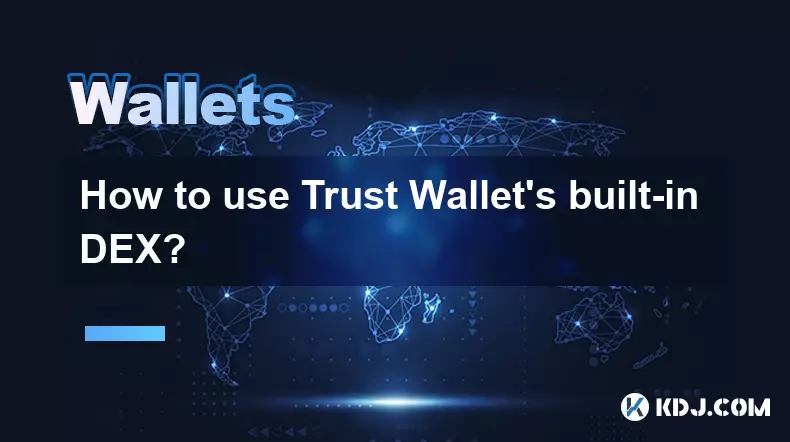
How to use Trust Wallet's built-in DEX?
Aug 29,2025 at 07:28am
Understanding Trust Wallet’s Built-in DEX1. Trust Wallet integrates a decentralized exchange (DEX) directly within its mobile application, allowing us...
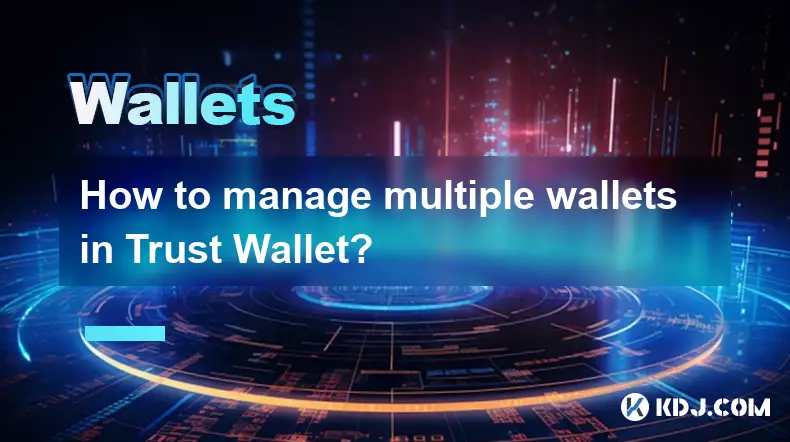
How to manage multiple wallets in Trust Wallet?
Aug 30,2025 at 04:45am
Understanding Wallet Management in Trust Wallet1. Trust Wallet supports a wide range of cryptocurrencies and tokens, allowing users to manage multiple...
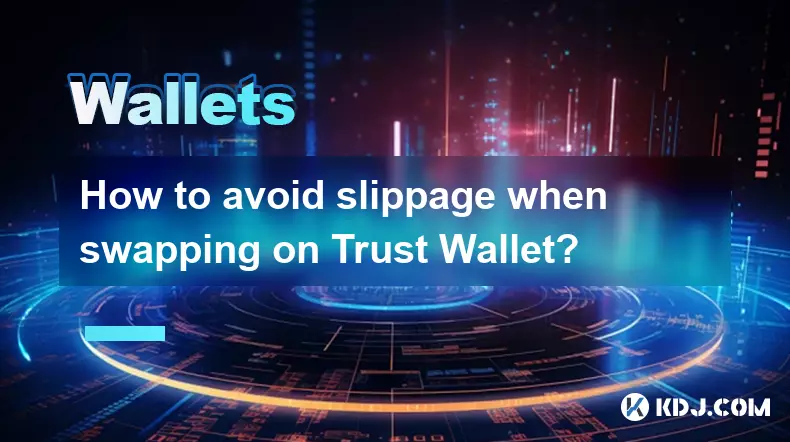
How to avoid slippage when swapping on Trust Wallet?
Aug 29,2025 at 03:01am
Understanding Slippage in Decentralized Exchanges1. Slippage occurs when the price of a cryptocurrency changes between the time a transaction is initi...
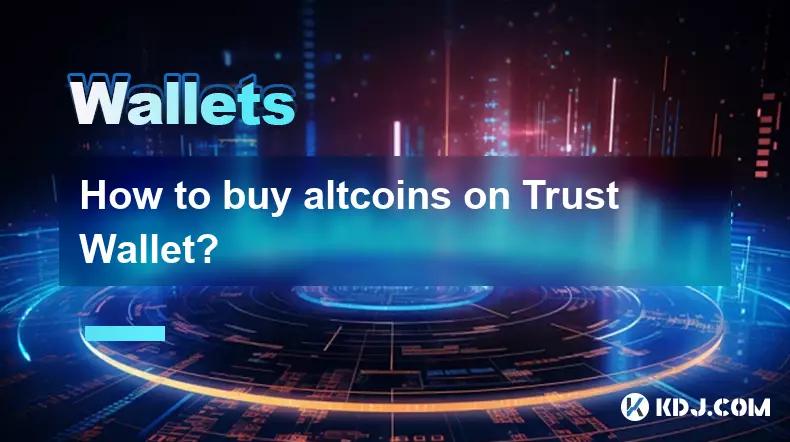
How to buy altcoins on Trust Wallet?
Aug 29,2025 at 11:36pm
Understanding Trust Wallet and Altcoin Purchases1. Trust Wallet is a non-custodial cryptocurrency wallet that supports a wide range of altcoins and bl...
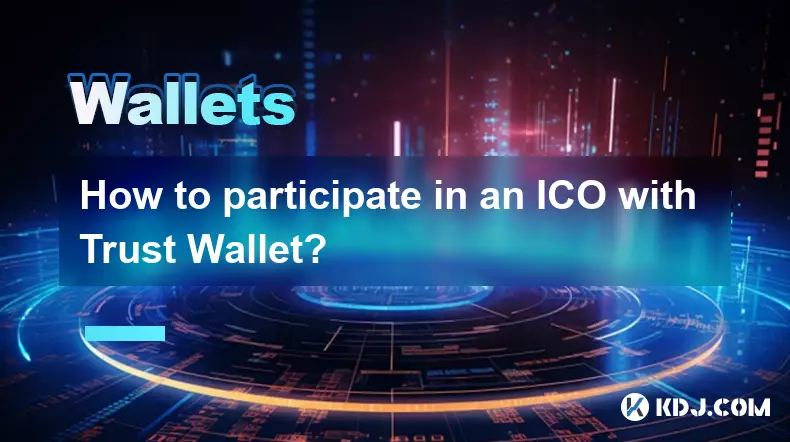
How to participate in an ICO with Trust Wallet?
Aug 30,2025 at 04:36pm
Understanding ICOs and Trust Wallet Compatibility1. Initial Coin Offerings (ICOs) are fundraising mechanisms used by blockchain projects to raise capi...
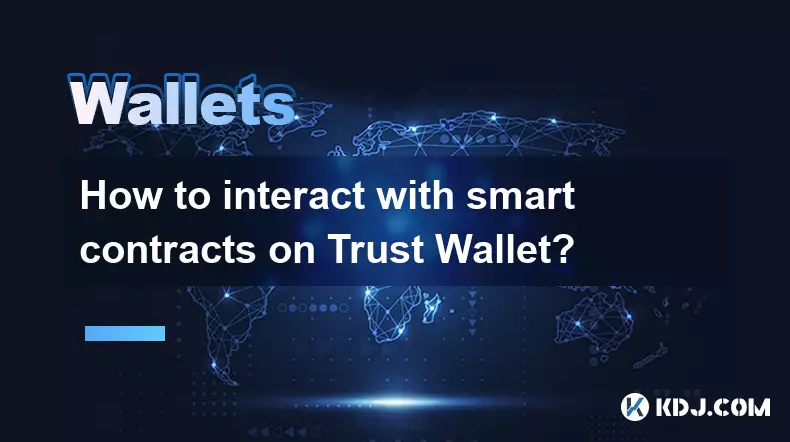
How to interact with smart contracts on Trust Wallet?
Aug 29,2025 at 01:28am
Understanding Smart Contracts and Trust Wallet Compatibility1. Smart contracts are self-executing agreements with the terms directly written into code...

How to use Trust Wallet's built-in DEX?
Aug 29,2025 at 07:28am
Understanding Trust Wallet’s Built-in DEX1. Trust Wallet integrates a decentralized exchange (DEX) directly within its mobile application, allowing us...

How to manage multiple wallets in Trust Wallet?
Aug 30,2025 at 04:45am
Understanding Wallet Management in Trust Wallet1. Trust Wallet supports a wide range of cryptocurrencies and tokens, allowing users to manage multiple...

How to avoid slippage when swapping on Trust Wallet?
Aug 29,2025 at 03:01am
Understanding Slippage in Decentralized Exchanges1. Slippage occurs when the price of a cryptocurrency changes between the time a transaction is initi...

How to buy altcoins on Trust Wallet?
Aug 29,2025 at 11:36pm
Understanding Trust Wallet and Altcoin Purchases1. Trust Wallet is a non-custodial cryptocurrency wallet that supports a wide range of altcoins and bl...

How to participate in an ICO with Trust Wallet?
Aug 30,2025 at 04:36pm
Understanding ICOs and Trust Wallet Compatibility1. Initial Coin Offerings (ICOs) are fundraising mechanisms used by blockchain projects to raise capi...

How to interact with smart contracts on Trust Wallet?
Aug 29,2025 at 01:28am
Understanding Smart Contracts and Trust Wallet Compatibility1. Smart contracts are self-executing agreements with the terms directly written into code...
See all articles





















